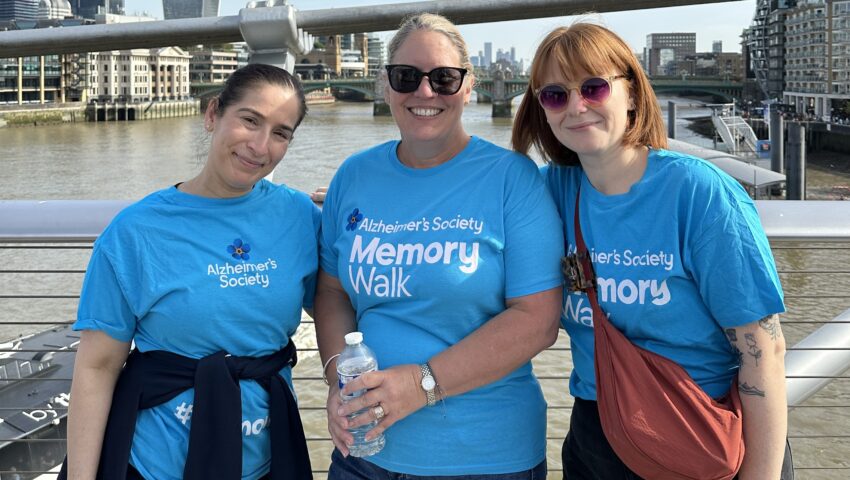Blogs
Coming together to support Alzheimer’s Society

Each year, Alzheimer’s Society holds Memory Walks across the UK. As the London Memory Walk winds its way along South and North bank of the Thames, it’s a chance to come together. I met my fellow ED&I team members in Potters Field Park and found our spot in the crowd. I peered past the starting line and felt lucky. The sun shone. Mirrored office buildings glistened, and Tower Bridge looked majestic as we meandered along the riverbanks.
There is something magical about walking in a community. It’s a touching reminder that we a part of a network of love and support. We shared memories of loved ones lost to Alzheimer’s as we walked. Grief never goes away, but the journey of healing encourages other parts of us to grow. Sharing our experiences of Alzheimer’s lets us know, we aren’t alone.
As our walk ended, I reflected on our impact. We raised over £400 and helped the Alzheimer’s Society fund vital research. A part of Alzheimer’s Society work is to provide essential care to those living with this disease. They believe everyone deserves to live a full life. Leading a full life has a myriad of meanings. For some it can mean seeing a new city, or experiencing new foods, or taking up a new hobby. Sometimes, fullness is the small moments. It’s an extra hug, kind words from someone you love, or catching up over coffee with a friend on Saturday morning. It’s these moments we need to hold on to. Alzheimer’s Society helps offer more of these moments to those with the disease, and we been a part of it.
Alzheimer’s disease affects millions of people worldwide, causing memory loss, cognitive decline, as well as many other symptoms. While there is no known cure for Alzheimer’s, research suggests that nutrition plays a vital role in both the prevention and management of the disease.
Nutritional tips that can help with prevention:
- Consume a Mediterranean diet: This diet has been linked to a reduced risk of Alzheimer’s disease as well as being associated with supporting good heart health and overall well-being. It is rich in fresh produce such as fruits and vegetables, whole grains, healthy fats (especially olive oil), lean proteins, fish (one of which is oily at least once a week), nuts (25g a day), seeds, and moderate red wine consumption.
- Include protein-rich foods: Look to include lean protein sources into your diet as protein provides us with the essential “building blocks” (amino acids) needed for brain health and neurotransmitters that help support cognitive function. Sources include poultry, fish, eggs, low-fat dairy, legumes, tofu, and tempeh.
- Add Omega-3 Fatty Acids: Found in oily fish (e.g., salmon, mackerel, and sardines), walnuts, flaxseeds, and chia seeds. These healthy fats can support brain health and reduce the risk of cognitive decline.
- Limit Sugar and Processed Foods: Excessive sugar and processed foods can lead to an increased risk of Alzheimer’s. Minimize your intake of sugary snacks, soda, and processed foods to maintain and support brain health. Whilst looking to make healthy swaps that include whole and unprocessed foods.
- Stay Hydrated: Dehydration can impair cognitive function. Make sure to drink plenty of water throughout the day to keep your brain properly hydrated. The UK recommendation is 1.5- 2 litres a day, however, this can vary depending on age, gender, how physically active you are, and climate.
Tips for Alzheimer’s Care
- Meal Planning: Planning well-balanced meals can be challenging for individuals with Alzheimer’s. Consider creating a routine meal plan with simple, familiar foods. Finger foods and soft textures can make eating easier.
- Supervision: Ensure that individuals with Alzheimer’s are supervised during mealtimes to prevent choking hazards and ensure they are eating adequately.
- Consistency: Maintain a consistent mealtime routine. Familiarity can help reduce confusion and anxiety.
- Hydration: Encourage regular fluid intake to prevent dehydration, but avoid excessive caffeine and alcohol, which can worsen symptoms.
- Seek Professional Guidance: Nutrition plays a crucial role in Alzheimer’s management, so it’s advisable to consult with a registered dietitian or a healthcare professional who specialises in this field. They can tailor dietary recommendations to individual needs and track progress.
Overall, although nutrition cannot cure Alzheimer’s disease, it can make an impact on its prevention and management. A healthy diet along with proper meal planning can improve the quality of life for individuals living with Alzheimer’s. It’s important to remember that your whole diet matters. There is no single food that can improve your health, It’s the variety of foods you eat and the nutrients from them that provide us with the additional benefits.



